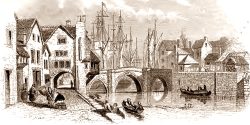Notes from the 1 October 1832 Edition
Residence that had been in the occupation of a surgeon, now deceased, offered for sale, along with garden, paddock of three acres, coach and cart houses, wine cellars and an optional 16 acres of land. Somewhere within 6 miles of Bridgwater.
Small’s meadow or pasture of 14 acres near Horlock in North Petherton offered to let.
‘Outrageous’ Vestry Meeting described, where the whig-supporting townsmen dominate. The meeting was to provide a list of possible ‘Waywardens‘ (officers to take care of highways) for the parish, but the political agitators instead provided a list of ten widows (presumably this was a joke as they’d not be able to carry out the role), which they presented to the town’s magistrates. The list was signed by T.W. Inman, and the Whig-supporting churchwardens are listed as him along with Jesty and Browne, these being supported by Lovibond and Bate and other ‘spouters’ of the political union of Whigs under C.K.K. Tynte. The magistrates apparently humiliated by this were the Mayor J.R. Poole with Aldermen Anstice and Watson. T.W. Inman is noted as an officer in the army on half pay.
Mention of an article in the Sherborne Journal about ‘unpleasant effluvia arising from the want of proper drainage at the eastern entrance to the town’ along with a mention of a drain currently being dug through Eastover (costing about £255). There follows a sharp criticism of the Sherbourne Journal ‘we have seldom seen a paragraph in that journal under the head BRIDGWATER NEWS, which did not contain either direct falsehoods, or truth wilfully or maliciously perverted’.
Mention of the 1st annual dinner of the Bridgwater Cricket Club, catered by Mr Hoare. About 50 people attended.
Richard Anstice elected mayor for the following year. Mr Stradling and Mr Thomas Howell Watson elected bailiffs.
Inquest on the body of Lucy Ann Woodward, an infant aged 1 3/4, daughter of Thomas Woodward, druggist. The baby fell from the window of a room in the upper storey of the house. Thomas’ shop was in the High Street, although he was dead by 1841, at which point his wife and son had taken over.
Another inquest, held at the Rock House Inn (Wembdon Hill) on the body of Elizabeth Spiller, aged 55. She was discovered dead by her husband, but was not ill beforehand. The death was ascribed to a ‘visitation by God’.


